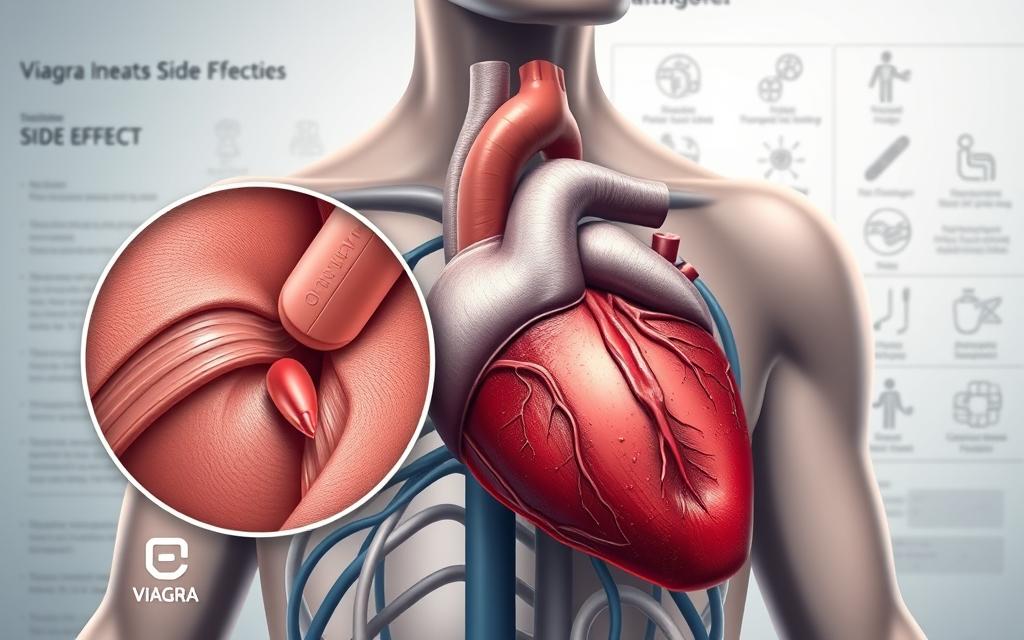Does Viagra Cause Erectile Dysfunction? Understanding the Risks and Effects
When it comes to treating erectile dysfunction, one of the most well-known medications is sildenafil citrate, commonly marketed under the brand name Viagra. While it’s designed to help men achieve and maintain an erection, some users have raised concerns about its potential side effects.
The active ingredient, sildenafil citrate, works by increasing blood flow to the penis. However, the relationship between this medication and erectile dysfunction is complex. It’s essential to understand that sildenafil citrate is prescribed to treat erectile dysfunction, not cause it.
Despite its efficacy as an erectile dysfunction treatment, some men may experience Viagra side effects. It’s crucial to weigh these potential risks and understand how sildenafil citrate works to make informed decisions about your treatment.
What is Viagra and How Does It Work?
Understanding Viagra and its role in treating erectile dysfunction starts with knowing its composition and how it works. Viagra, a brand name for a medication used to treat erectile dysfunction, has been a significant breakthrough for millions of men worldwide.
The Active Ingredient: Sildenafil Citrate
The active ingredient in Viagra is sildenafil citrate, a phosphodiesterase type 5 (PDE5) inhibitor. Sildenafil citrate works by relaxing the smooth muscles in the blood vessels of the penis, thereby increasing blood flow. This process is crucial for achieving and maintaining an erection.
Some key points about sildenafil citrate include:
- It is the primary component responsible for Viagra’s effectiveness.
- Sildenafil citrate is also used in other medications for similar purposes.
- The dosage is critical, as it affects both efficacy and safety.
Mechanism of Action in the Body
When a man is sexually aroused, the arteries in the penis relax and widen, allowing more blood to flow in. Simultaneously, the veins that drain blood from the penis compress, trapping the blood inside. Sildenafil citrate enhances this natural process by inhibiting the action of PDE5, an enzyme that breaks down cyclic guanosine monophosphate (cGMP), a key molecule involved in erection.
The main effects of Viagra’s mechanism of action are:
- Increased blood flow to the penis during sexual stimulation.
- Enhanced ability to achieve and maintain an erection.
The Purpose of Viagra: Treating Erectile Dysfunction
Viagra’s role in managing erectile dysfunction is multifaceted, involving both physiological and psychological aspects. Erectile dysfunction, or ED, is a condition where men have difficulty achieving or maintaining an erection sufficient for satisfactory sexual performance.
Treating erectile dysfunction effectively is crucial for the overall sexual health of affected individuals. Viagra, known generically as sildenafil, is a medication that has been widely used for this purpose.
How Viagra Enhances Sexual Function
Viagra works by increasing blood flow to the penis during sexual stimulation, helping men achieve and maintain an erection. This is achieved through its active ingredient, sildenafil citrate, which relaxes the smooth muscles in the blood vessels, thereby improving blood flow.
The Viagra benefits extend beyond just treating erectile dysfunction; it also enhances the overall sexual experience by restoring confidence and improving the ability to engage in sexual activity.
Approved Medical Uses
Viagra is approved for the treatment of erectile dysfunction. It is also used for the treatment of pulmonary arterial hypertension (PAH), a condition characterized by high blood pressure in the arteries that supply blood to the lungs.
| Approved Use | Description |
|---|---|
| Erectile Dysfunction | Treatment of erectile dysfunction in men |
| Pulmonary Arterial Hypertension (PAH) | Treatment of high blood pressure in the arteries supplying the lungs |
Understanding the approved medical uses of Viagra is essential for safe and effective treatment. Always consult a healthcare professional before using Viagra or any other medication.
Common Side Effects of Viagra
When considering the use of Viagra, it’s essential to understand the potential side effects that may arise. Viagra, known for its efficacy in treating erectile dysfunction, can cause a variety of side effects in some users.
Short-Term Side Effects
Short-term side effects of Viagra can occur shortly after ingestion and may include headaches, dizziness, and flushing. These effects are typically mild and transient, resolving on their own without the need for medical intervention.
Common short-term side effects include:
- Headaches
- Dizziness
- Flushing
- Nausea
- Visual disturbances
Long-Term Side Effects
Long-term side effects are less common but can be more serious. Prolonged use of Viagra may lead to issues such as priapism, a condition characterized by a prolonged erection that is not associated with sexual arousal.
The following table summarizes the potential short-term and long-term side effects associated with Viagra:
| Side Effect Category | Common Side Effects |
|---|---|
| Short-Term | Headaches, dizziness, flushing, nausea, visual disturbances |
| Long-Term | Priapism, vision loss, hearing loss, cardiovascular issues |

It’s crucial for individuals taking Viagra to be aware of these potential side effects and to consult with a healthcare provider if any concerns arise. By understanding the risks associated with Viagra, users can make informed decisions about their treatment.
Does Viagra Cause Erectile Dysfunction?
Viagra, a medication widely used to treat erectile dysfunction, raises a paradoxical question: can it cause the very condition it is designed to alleviate? This inquiry is crucial for understanding the potential risks associated with Viagra use.
The Paradoxical Question Explained
The concern that Viagra might cause erectile dysfunction stems from its mechanism of action and the body’s response to it. While Viagra is effective in enhancing erectile function for many men, there are instances where it may lead to dependency or have adverse effects.
Key factors to consider:
- The role of sildenafil citrate, the active ingredient in Viagra
- The impact of Viagra on blood flow and erectile tissue
- Potential psychological dependence on the medication
Scientific Evidence and Research Findings
Numerous studies have investigated the relationship between Viagra use and erectile dysfunction. Research indicates that while Viagra is generally safe and effective, there are instances where it may contribute to erectile dysfunction, either temporarily or as part of a more complex condition.
Key research findings include:
- A study published in the Journal of Sexual Medicine found that long-term use of PDE5 inhibitors like Viagra could lead to changes in erectile function.
- Research in the International Journal of Impotence Research suggested that psychological factors play a significant role in the development of erectile dysfunction in men using Viagra.
Temporary vs. Permanent Effects
Distinguishing between temporary and permanent effects of Viagra on erectile dysfunction is essential. Temporary effects may be related to the body’s adjustment to the medication or psychological factors, whereas permanent effects, if they occur, are more concerning and less common.
Considerations for temporary vs. permanent effects:
| Effect Type | Characteristics | Potential Causes |
|---|---|---|
| Temporary | Short-term changes in erectile function | Adjustment to medication, psychological factors |
| Permanent | Long-term or irreversible erectile dysfunction | Rare, potentially related to underlying health conditions or prolonged misuse |
Understanding the nuances between temporary and permanent effects can help men make informed decisions about using Viagra for erectile dysfunction.
Psychological Dependence on Viagra
While Viagra is effective in treating erectile dysfunction, its impact on the psychological aspect of sexual health is multifaceted. The reliance on medication for sexual performance can lead to a complex psychological dynamic.
Performance Anxiety and Reliance
One of the significant psychological aspects affected by Viagra is performance anxiety. Men using Viagra may start to rely heavily on the medication, fearing that without it, they might experience erectile dysfunction. This reliance can stem from or exacerbate performance anxiety, creating a vicious cycle.
The anxiety of not being able to perform sexually without Viagra can be overwhelming, potentially leading to a psychological dependence on the drug. This dependence is not just about the physical act of erection but also about the confidence it instills.
The Placebo Effect and Confidence Issues
The placebo effect also plays a significant role in the psychological impact of Viagra. Users might experience improved sexual performance not just due to the drug’s active ingredient but also because they believe it will work. This psychological boost can sometimes be misattributed to the drug’s efficacy, further entrenching reliance.
Moreover, confidence issues can arise or be exacerbated when the medication is not available or fails to produce the desired effect. This can lead to a fragile self-esteem that is heavily dependent on the drug’s success.
| Psychological Aspect | Description | Potential Outcome |
|---|---|---|
| Performance Anxiety | Fear of not being able to perform sexually | Increased reliance on Viagra |
| Placebo Effect | Belief in the drug’s efficacy improves performance | Enhanced psychological dependence |
| Confidence Issues | Self-esteem tied to drug’s success | Reduced self-confidence without Viagra |
Physical Dependence Concerns
Physical dependence on Viagra is a complex issue that warrants a closer examination of its effects on the body. As a medication, Viagra is designed to treat erectile dysfunction by enhancing blood flow. However, concerns have been raised about its potential impact on physical dependence and overall sexual health.

One of the primary concerns is the development of tolerance to Viagra. Tolerance development refers to the body’s adaptation to the drug, potentially requiring higher doses over time to achieve the same effect. While Viagra is not typically considered addictive in the classical sense, the need for increasing doses can be a concern.
Tolerance Development: Myth or Reality?
The notion that Viagra leads to tolerance is a subject of debate. Some studies suggest that long-term use can result in decreased efficacy, necessitating higher doses. However, others argue that this is not a universal experience and that many men continue to benefit from the standard dosage. It’s essential to understand that individual responses to Viagra can vary significantly.
- Factors influencing tolerance include dosage and frequency of use.
- Healthcare providers often recommend the lowest effective dose to minimize potential risks.
Impact on Natural Erectile Function
Another critical aspect is the impact of Viagra on natural erectile function. Concerns have been raised that reliance on the medication could potentially hinder the body’s natural ability to achieve an erection. However, research indicates that Viagra, when used as directed, does not cause permanent erectile dysfunction. In fact, it can help restore confidence and improve erectile function in many men.
Key considerations for minimizing risks include:
- Using Viagra only as prescribed by a healthcare provider.
- Monitoring erectile function and adjusting treatment as necessary.
Rebound Erectile Dysfunction After Viagra Use
Understanding the risks associated with Viagra use, including rebound erectile dysfunction, is crucial for effective treatment. Rebound erectile dysfunction refers to the worsening of erectile dysfunction symptoms after stopping the medication. This phenomenon can be concerning for individuals who rely on Viagra to manage their condition.
Understanding Rebound Effects
Rebound effects occur when the body becomes accustomed to a medication, in this case, Viagra, and experiences a negative reaction upon its cessation. Rebound erectile dysfunction can manifest as a significant decrease in erectile function, making it difficult to achieve or maintain an erection without the medication.
The exact mechanisms behind rebound erectile dysfunction are complex and multifactorial. Factors such as psychological dependence, changes in natural erectile function, and the body’s adaptation to the drug can contribute to this condition.
Managing Post-Medication Symptoms
Managing post-medication symptoms requires a comprehensive approach. This includes gradual tapering off the medication under medical supervision, adopting lifestyle changes to improve erectile function, and exploring alternative treatments for erectile dysfunction.
| Strategy | Description | Benefits |
|---|---|---|
| Gradual Tapering | Gradually reducing the dosage of Viagra under medical supervision. | Reduces the risk of rebound effects. |
| Lifestyle Changes | Adopting a healthier lifestyle, including diet and exercise. | Improves overall erectile function. |
| Alternative Treatments | Exploring other treatments for erectile dysfunction. | Provides options for managing ED without relying on Viagra. |
Common Misconceptions About Viagra and ED
Despite its popularity, Viagra is surrounded by myths and misconceptions regarding its use and efficacy in addressing erectile dysfunction. Many individuals are misinformed about how Viagra works, its side effects, and its potential to cause or exacerbate erectile dysfunction.
Debunking Popular Myths
One common myth is that Viagra is a cure-all for erectile dysfunction. In reality, Viagra is a treatment that works for many men but not all. It’s essential to understand that erectile dysfunction can stem from various causes, including underlying health conditions, lifestyle factors, and psychological issues. Viagra is effective for treating erectile dysfunction related to certain of these causes but is not a universal solution.
Another misconception is that Viagra can lead to dependence. While psychological dependence is a potential concern, the physical dependence on Viagra is not typically a significant issue when used as directed.
Facts vs. Fiction in Viagra Usage
Separating fact from fiction is crucial when considering Viagra for erectile dysfunction. For instance, the notion that Viagra causes erectile dysfunction is more fiction than fact; it’s often used to treat the condition. However, misuse or underlying health issues can lead to complications.
| Myth | Fact |
|---|---|
| Viagra is a cure for erectile dysfunction. | Viagra treats erectile dysfunction in many cases but is not a cure-all. |
| Viagra causes physical dependence. | When used correctly, Viagra is not typically associated with physical dependence. |
| Viagra is unsafe for men with heart conditions. | While caution is advised, many men with heart conditions can safely use Viagra under medical supervision. |
Understanding the facts about Viagra can help individuals make informed decisions about their treatment options for erectile dysfunction. It’s always recommended to consult with a healthcare professional to address specific concerns and determine the best course of treatment.
Proper Usage Guidelines to Minimize Risks
Proper usage of Viagra is key to minimizing its potential risks and maximizing its benefits. To achieve the desired therapeutic effects while reducing the likelihood of adverse reactions, it’s crucial to follow established guidelines.
Dosage Recommendations
The recommended starting dose for Viagra is typically 50 mg, taken as needed, approximately one hour before sexual activity. However, the dosage may be adjusted based on individual response and tolerance. The maximum recommended dose is 100 mg, and it should not be taken more than once per day.
Frequency of Use Considerations
Viagra is intended for on-demand use before sexual activity. It’s not recommended for daily use unless specified by a healthcare provider. The frequency of use should be limited to once per day to minimize potential side effects.
Contraindications and Warning Signs
Certain individuals should avoid using Viagra or use it with caution. Contraindications include the use of nitrates, severe hepatic impairment, and known hypersensitivity to sildenafil. Warning signs that require immediate medical attention include priapism, sudden vision loss, and severe hypotension.
| Condition | Recommended Action | Risk Level |
|---|---|---|
| Nitrate Use | Avoid Viagra | High |
| Severe Hepatic Impairment | Use with Caution | Moderate |
| Hypersensitivity to Sildenafil | Avoid Viagra | High |
By adhering to these guidelines, individuals can minimize the risks associated with Viagra and ensure a safe treatment experience.
Alternative Treatments for Erectile Dysfunction
Erectile dysfunction treatment extends beyond Viagra, with various alternatives worth exploring. While Viagra is a widely recognized medication, other options can provide effective relief for those experiencing erectile dysfunction.
Other Medications
Several other medications are available for treating erectile dysfunction, including Cialis (tadalafil) and Levitra (vardenafil). These medications work similarly to Viagra by enhancing blood flow to the penis, but they have different durations of action and side effect profiles.
For instance, Cialis is known for its longer duration of action, often lasting up to 36 hours, earning it the nickname “the weekend pill.” Levitra, on the other hand, is known for its rapid onset of action.
Non-Pharmaceutical Approaches
Beyond medication, several non-pharmaceutical approaches can help manage erectile dysfunction. These include vacuum erection devices, which use a vacuum pump to increase blood flow to the penis, and penile implants, which are surgically implanted devices that can help achieve an erection.
Another option is penile injections, where medication is directly injected into the penis to stimulate an erection. While effective, these methods require careful consideration and consultation with a healthcare provider.
Lifestyle Modifications
Making certain lifestyle changes can also significantly impact erectile dysfunction. Dietary adjustments, such as increasing intake of fruits, vegetables, and whole grains, can improve overall vascular health. Regular exercise and maintaining a healthy weight are also beneficial.
Additionally, reducing stress through techniques like meditation or yoga, and avoiding tobacco and excessive alcohol, can further contribute to improved erectile function.
Conclusion
Viagra has been a widely used treatment for erectile dysfunction, but its role in managing the condition is complex. Throughout this article, we’ve explored the intricacies of Viagra, from its mechanism of action to its potential side effects and the risk of dependence.
It’s essential to understand that Viagra is a treatment option, not a cure for erectile dysfunction. The medication can provide relief for many men, but it’s crucial to weigh the benefits against the potential risks and consider alternative treatment options.
By making informed decisions about Viagra use, individuals can effectively manage erectile dysfunction. This involves understanding proper usage guidelines, being aware of potential interactions, and exploring other treatment options, including lifestyle modifications and non-pharmaceutical approaches.
Ultimately, the key to successfully treating erectile dysfunction with Viagra lies in a comprehensive understanding of the medication and its effects on the body. By staying informed and consulting with healthcare professionals, individuals can navigate the complexities of erectile dysfunction treatment and make the best choices for their health.
